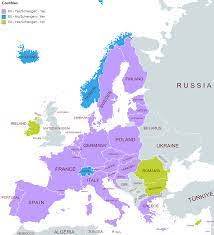Traveling to European Union (EU) countries is a dream for many globetrotters, but it's essential to understand that each country has its own visa requirements. Some EU countries have relatively stringent visa processes, making it important to be well-prepared when planning your visit. This article highlights the top EU countries with high visa requirements, helping you navigate through the intricacies and complexities of their visa processes.
United Kingdom
The United Kingdom (UK) has always been known for its strict visa policies. With Brexit, the UK introduced new immigration rules that apply to both EU and non-EU citizens. Travelers from most countries, including EU member states, now need to apply for a visa in advance to enter the UK. The specific visa type will depend on the purpose of your visit, such as a tourist visa, student visa, or work visa. It's crucial to carefully review the requirements and ensure you have all the necessary documents to avoid any complications.
France
France, a popular tourist destination, has its own visa requirements for non-EU citizens. Depending on the purpose and duration of your stay, you may need to apply for a Schengen visa or a specific French visa. The process can involve submitting detailed itineraries, flight and hotel reservations, proof of financial means, travel insurance, and other supporting documents. It's advisable to apply well in advance and be prepared to provide all the required information to obtain a French visa.
Germany
Germany, known for its strong economy and vibrant culture, has a rigorous visa application process. Non-EU citizens planning to visit Germany for tourism, business, or study purposes must go through the Schengen visa application process. You will need to provide documentation such as flight itineraries, hotel reservations, proof of financial means, and health insurance coverage. It's important to note that the German visa process may take several weeks, so it's wise to apply well in advance of your intended travel date.
Spain
Spain, with its beautiful beaches, vibrant cities, and rich history, is a sought-after destination. Non-EU citizens visiting Spain for tourism or business purposes typically require a Schengen visa. The visa application process involves submitting various documents, including flight itineraries, hotel bookings, proof of sufficient funds, and travel insurance. It's important to note that Spain may require additional documents, such as an invitation letter or proof of ties to your home country, to support your visa application.
Italy
Italy, famous for its art, history, and culinary delights, has its own visa requirements for non-EU citizens. Whether you plan to explore the ancient ruins of Rome, meander through the canals of Venice, or indulge in delicious pizza in Naples, you'll likely need a Schengen visa. The visa application process typically requires submitting detailed travel itineraries, proof of accommodation, financial means, and travel insurance. It's advisable to carefully review the specific requirements and ensure you have all the necessary documents to obtain an Italian visa.
Greece
Greece, known for its stunning islands, ancient ruins, and warm hospitality, attracts millions of tourists each year. Non-EU citizens planning to visit Greece for tourism or business purposes usually need a Schengen visa. The visa application process entails providing supporting documents, such as flight itineraries, hotel reservations, proof of financial means, and travel insurance. Additionally, Greece may require specific documentation, such as a letter of invitation or a detailed travel plan. It's important to thoroughly research the requirements and prepare all the necessary documents to ensure a smooth visa application process.
Conclusion
While exploring the top EU countries is an exciting prospect, it's crucial to be aware of their specific



